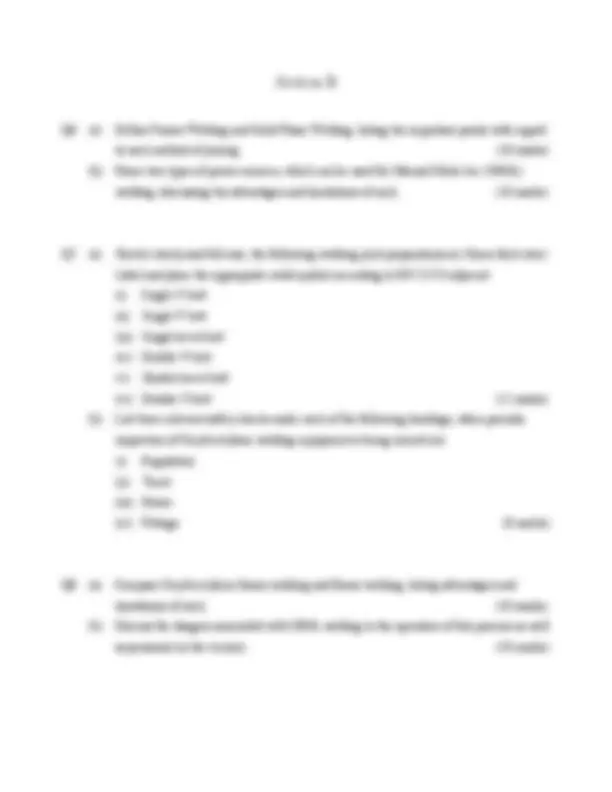



Study with the several resources on Docsity

Earn points by helping other students or get them with a premium plan


Prepare for your exams
Study with the several resources on Docsity

Earn points to download
Earn points by helping other students or get them with a premium plan
Community
Ask the community for help and clear up your study doubts
Discover the best universities in your country according to Docsity users
Free resources
Download our free guides on studying techniques, anxiety management strategies, and thesis advice from Docsity tutors
A past exam for the manufacturing technology module of the higher certificate in engineering in mechanical engineering program at cork institute of technology, held in autumn 2006. The exam covers various topics related to drilling machines, height gauges, grinding wheels, taps, and welding. It consists of five questions in section a and two questions in section b, with separate answer books required for each section. All questions carry equal marks.
Typology: Exams
1 / 3

This page cannot be seen from the preview
Don't miss anything!


(NFQ –Level 6)
Instructions. Examiners:.Mr.M.J.Daly Answer FIVE questions. Answer THREE Mr.R.Kennedy questions from Section A and TWO questions Mr.J.Burns from Section B. Mr.J Connolly Use separate answer books for each Section. Mr.R.Simpson All questions carry equal marks.
Q1. (a) What is the difference between a sensitive and non-sensitive drilling machine? (2 marks) (b) With the aid of a neat detailed cross section drawing of a drilling machine spindle assembly, indicate how both rotary cutting motion and sliding feed motion are achieved. (12 marks) (c) Indicate with the aid of a neat diagram, the following on a sensitive drilling machine: (i) spindle feed stop (3 marks) (ii) speed adjustment (without the aid of a gearbox). (3 marks)
Q2. (a) With the aid of a neat detailed diagram, describe a vernier height gauge. (12 marks) (b) What important precautions should you observe before using the height gauge? Briefly state, with the aid of a diagram, how might it be put right, assuming there is a problem with it. (4 marks) (c) Show a partial diagram of a height gauge reading 37.97 mm. (4 marks)
Q3. (a) State the purpose of blotters when mounting a grind wheel. (5 marks) (b) Describe the method of checking a vitrified wheel for soundness. (3 marks) (c) Explain the difference between truing and dressing the wheel. (2 marks) (d) Explain the causes of “glazing” and how the problem can be corrected. (5 marks) (e) Name the tool and show how it is used to dress a grind wheel. (5 marks)
Q4. (a) How would you determine accurately the size of drill if the size mark has been worn off the shank? (2 marks) (b) How many taps are there in a set, name the taps and give a reason why each is required? (7 marks) (c) What kind of thread is cut on the screw of (i) a quick release vice? (2 marks) (ii) the leadscrew of a lathe (2 marks) (d) Give an example of counterboring, countersinking and spotfacing as used in engineering. (7 marks)
Q5. (a) What precautions, if any, should be noted when attaching a vice to a bench? (3 marks) (b) Make a neat sketch of a bench vice with the quick grip action. Name the parts. (10 marks) (c) With the aid of a neat sketch, show how the quick-grip action is operated, and state the type of thread used in its spindle. (5 marks) (d) What materials would be used in the manufacture of the vice mentioned at (b)? (2 marks)